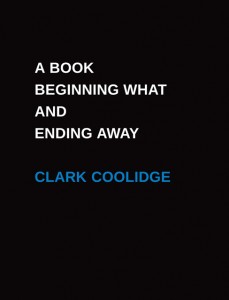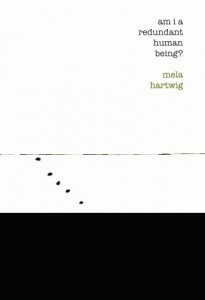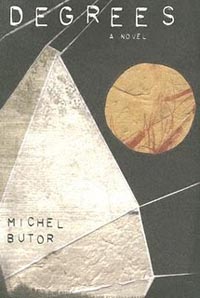Joe Milazzo’s SUMMER READS
Summer reading picks from Joe Milazzo:
***
 A Book Beginning What and Ending Away by Clark Coolidge (Fence Books, 2013)
A Book Beginning What and Ending Away by Clark Coolidge (Fence Books, 2013)
Partly out of excitement to have this work restored to print; Coolidge is neither understood nor celebrated enough as a prosodist, or, if you prefer, prose thinker, à la Stein (I know this mostly from his writings on jazz / improvised music); the book itself just long and packed / impacted enough to occupy a season.
Randomly selected excerpt: “Door only to be taken in. Mingles into the corner as it comes. Enough, and green, and by and large, were familiar.”
 My Dead by Amy Lawless (Octopus, 2013)
My Dead by Amy Lawless (Octopus, 2013)
Have you seen the table of contents? The volume opens with 8 individual poems, all entitled “One Way to Write a Sonnet Is To Number the Lines.” This appeals to me, and aligns with my own formal / lyrical interests.
Randomly selected excerpt: “Night is ugly as all the other shit / I just mentioned”
 Am I A Redundant Human Being? by Mela Hartwig (Dalkey Archive, 2010)
Am I A Redundant Human Being? by Mela Hartwig (Dalkey Archive, 2010)
I picked this up at the open of the year courtesy Dalkey’s annual sale, but have not yet been able to see if the book itself satisfies the expectations (high-ish… is this Madame Bovary without the self-delusion, an early negation of the novel [an imitation of Arthur Schnitzler tangenting itself into anticipations of Tao Lin], or a Modernist self-help manual?) I have for it based on the title.
Randomly selected excerpt: “Of course, his obvious attraction flattered me. But, then again, maybe it didn’t.”
June 5th, 2013 / 11:00 am
By Kelman Out Of Pessoa
 By Kelman Out Of Pessoa
By Kelman Out Of Pessoa
by Doug Nufer
Les Figues Press, 2011
194 pages / $15 Buy from Les Figues or SPD
Why write a conceptual novel? Is conceptual writing meant to be read? Is conceptual writing truly “conceptual” in the way conceptual art was? If conceptual art was more to be read than it was to be seen, then, following the same “logic,” is conceptual writing more of a spectacle than it is a reflection? Isn’t writing by and large dematerialized anyway? Doesn’t reading atomize as much as it coheres? Isn’t the novel ultimately only intelligible in terms of a material transcendence? Is Douglas Nufer’s By Kelman Out Of Pessoa more Sol Lewitt or more Rene Girard?
I think the latter rather than the former. I think the conflation of Oulipian constraint and conceptual aesthetics has become too easy. I think schematicism need not make a virtue of the perfunctory. I think that novels like Nufer’s, or Harry Mathews’ Cigarettes, can simultaneously be novels and “anti-novels”: mere pretexts or engines for putting one word, then one sentence, then one paragraph, then one chapter, after another, but also “subjective experiences” that offer readers traditional pleasures and vertigos. I think that the author’s and the reader’s processes have to collaborate in order to complete the novel, and this book; they are symbiotic, even if one antedates / predates (upon?) the other. I think all novels—and, by extension, all characters, all points-of-view, all settings, all symbols, all themes—are thus accidents of time, eruptions of advantage and disadvantage. I think about Michel’s capture in Bresson’s Pickpocket, how it is a direct result of his notion of who he is in relationship to someone else who, in a context explicitly over-determined by competitiveness, is not quite whole or anything beyond a phantom. I think that readers always have a hand out for the last word.
Louis Bury, in his introduction, writes: “Doug Nufer wrote By Kelman Out Of Pessoa by going to the track once a week for an entire horseracing season, placing bets on behalf of three fictional characters’, the results of which, in turn, dictated the structure and plot of the novel.” Louis Bury, in his introduction, writes: “The difference between the type of order play produces and the type of order art produces is that the former tends towards reductive simplicity, the latter towards complexity, even entropy.” Louis Bury, in his introduction, writes: “Each of the novel’s principal literary influences can be seen as the embodiment of a novelistic desire. Kelman: the desire to write about horse betting and have it be something other than genre fiction. Pessoa: the desire to make an elaborate show of masking and unmasking aspects of oneself.” Louis Bury, in his introduction, writes: “Blaise Pascal’s famous wager—that it’s a good bet to believe in God because if you win you gain everything and if you lose you lose nothing—was a bet, ultimately, not about God’s existence but about the nature of life itself: that we humans possess more purpose and meaning to our movements than mere game board tokens.”
What are we really saying when we say that a work of art, like a novel, “moves us”? What are we really saying when we say that we want to improve ourselves? What are we really saying when we say we’ve been a victim of bad luck? What are we really saying when we say that we’ve sabotaged ourselves? What are we really saying when we say that the story means what it does when it comes to its end? What are we really saying when we say, “Don’t worry; I’ve got a plan.” What are we really saying when we say we want to be more or less like so-and-so? What are we really saying when we say that there is a real world? What are we really saying when we say to writers: “Small is beautiful”? “Kill your darlings”? “Find your voice”? “Write what you know”? “Don’t lose your reader”?
January 7th, 2013 / 12:00 pm
25 Points: The Emily Dickinson Reader
 The Emily Dickinson Reader: An English-to-English Translation of Emily Dickinson’s Complete Poems
The Emily Dickinson Reader: An English-to-English Translation of Emily Dickinson’s Complete Poems
by Paul Legault
McSweeney’s, 2012
247 pages / $17.00 buy from McSweeney’s
[Note: In the text that follows, the leading number refers to the catalog number assigned to each Dickinson poem and its accompanying translation. These numbers are derived from the Franklin (1999) edition of Dickinson’s oeuvre. The trailing trailing number appearing in square brackets references the actual “point number”, and thus the in order in which the reviewer would prefer, although would not require, that these 25 points be read. JM]
12. Concurrent with my reading of Legualt, I’ve been following Brandon Brown @ Harriet (the blog) on translation. How he says, “There is no master.” I feels it applies here, too. But maybe Brown and Legault are colleagues, correspondents, even. (One of them, surely, is wren-like and sherry-eyed.) Or the inventions are independent identicals, like Darwin and that other guy*. I imagine Brown and Legault meeting in some profile coastal city with a very specifically desirably demographic profile, dotted with saloons and taverns, meeting over craft beers intensely hoppy and a shared literary ambivalence which tastes of salt without being salty per se. But this meeting, which is like a prelude to a deeper or longer encounter, this meeting wordless, sudsy… these beers, these refreshments bitter and compulsory… the possibility of Brown and Legault merely overlapping at the bar is as far as my imagination goes. And is this stopping heartful, braked by the anxiety of influence? “Emily Dickinson wrote in a language all her own, thus the need for this English version of what she meant.” (7) Wait, so does the agony of influence deny the mortification of the flesh? [3]
29. Handed over to the hand that writes, “simple” and “direct” are always driven forward. I mean, forward as out or away, into that exile that enable observation, not into the completed future of conveyance. (That, and I just don’t trust McSweeney’s.) [4]
98. Biography bugs me most of all. I wish we had no daguerrotypes of Dickinson to caption. I wish reading really pressed some sort of pause button on life itself. I wish I didn’t feel like I, too, know how caretaking will warp you. [16]
167. But with such rueful wishing, if not in it, a realization disappoints me with surprise and surprises me with disappointment: I have this idea all the time. [25]
221. Translation isn’t telling, much less re-telling. But it snags in the same temporal flow as does narrative. [7]
319. What was Dickinson herself translating? Emerson? Swedenborg? Whiteness: “racial,” temperamental, existential (not a word she would have recognized, not for all the tenements in Amherst)? The Puritanism that idles with such delightful perversity in Frost’s “The Generations of Men”? The erotics of a universal chlorosis? Proverbs she found when she dreamed of communion in the hills so misty from her gnomic lookout? Hell, that’s it. Dickinson, even her doubts are too bold. For all Legault’s contemporary light shines, it can’t cast her shadows. [8]
333. Not that I think Dickinson’s—or any poet’s poetry, for that matter—is inviolable. Reading it will always rough it up anyway. But what about introversion? [2]
392. Consider Paul Legault’s project a sort-of ekphrasis on Dickinson’s unwritten autobiography. Consider that Dickinson’s medium isn’t poetry, that Legault’s isn’t comedy (though more than a few of these read as if they could have been spouted by a vintage, arrow-through-the-head Steve Martin), that there is no translation evident here, only notation, only commentary, only adumbration, thoughts broken in the process of their own manufacture by the machine that is, quite literally is, addiction to the author’s held-out promise of exegesis. Consider your prurient self covertly mocked. [21]
421. Emily Dickinson isn’t your friend, and never was. Anyway, friendship thrives on novels (its parasitic), not poems. And Emily Dickinson does care, in the sense that she wants to know something true of her own being. That she would exemplar herself, if only privately. [20]
438. The apostrophe of the second-guess. The syntax of the spit-take. After all, the literal is the absurd. [13] READ MORE >
January 3rd, 2013 / 12:09 pm
25 Points: The Mandarin
 The Mandarin
The Mandarin
by Aaron Kunin
Fence Books, 2008
209 pages / $17.95 buy from Fence
1) Language is a form of disobedience.
2) Or: words have no loyalty. Or: language facilitates perversity. Or: to speak is to be reminded of language’s inescapable techné. Or: to employ language is to court malfunction. Or: to write is to run the risk of making more sense than you ever intended. Or: language is always on the cusp of being carried away. Or: talking is almost always talking back. Or: language was designed in emulation of water, a force, a flow without shape but the rare ability to hunt direction down and wear it out. Or: nothing could be more nonsensical than if our every utterance were understood literally. Or: you teach a child to say “no” at your own peril; those early “no“‘s are no ventriloquism act. Or: the so-called precise word is precisely that, so-called, a chimera. Or: to speak is to confuse irrevocably the matter of whether one is announcing something before it happens, or whether one is announcing something as a way of compelling its presence to coincide with its occurrence.
3) Aaron Kunin’s novel The Mandarin is a self-conscious (perhaps even sentient) construction of language, some phenomena I wish to differentiate from the notion of a linguistic construction… For I want the suggest that The Mandarin is more like a self-organizing discourse than it is a “work” composed-slash-authored. The Mandarin is thus less a novel as commonly defined in terms of “long story” than it is an exercise in novel-ese, or the novel as style. This is not to say that either text or author fail in any way to fully realize whatever metaphysical potential is latent in the novel-as-form. Rather, what I want to claim for this book is that it is a brilliant, occasionally scathing, yet ultimately poignant tribute to the inherent limitations of an imagination whose eide and eidola alike are utterly—dimensionally—verbal.
4) Or: The Mandarin is an exceptionally manneristic “novel of manners.”
5) Or: if you squint at it in the proper way, this is a conceptual novel. Kunin supplies a 3-page synopsis that you need not read past, excepting you wish to satisfy your curiosity regarding the novel’s execution. Quoted in full, however, I find that this explanation is just a scheme for disclosing a question that, in order to be dramatic, cannot remain undisclosed; that is, must be secret, only formerly. Is this synopsis a lie?
6) In a sense, the book is naming itself every time one look at its cover or spine, insisting that it has to remind you that it is a novel, a book that has to be taken “seriously.” And, as much as this title’s prodding is about a kind of salesmanship, the relationship between word and world is more suspect than that. Most “things” can’t speak the way a book can, nor do they suffer the arc of the Lomans. (The main character and narrator upon whom Kunin depends is a Willy.)
7) And what is a mandarin anyway? A living etymology, thus a kind of fossil, a word that survives despite going largely unused; a museum exhibit that does not have to be put on wheels because it installs itself everywhere around you the moment you decide to judge it into being. (And every time you recall Henry James.). Mandarin: it’s a pejorative, and what makes our mandarins so worthy of disdain—and so funny—is the complete un-self-consciousness (rather: blind narcissism) of the pose. Such is pedantry, this trying-so-hard-all-you-do-is-drown-flailing-in-gelatinous-effort. Even if taken as an adjective, “mandarin” is a point-of-view compact in its three syllables. An evaluation, and a coping with something which looks familiar but which we, uttering, would like to believe has naught to do with us or our position. But the use of a term like this is a power-play: it elevates us, uttering, to some superior vantage from which we can describe a sham noble. And phoniness makes of such rare essence the cheapest cardboard: what a noun like “elitism” names, just as that The here qualifies and specifies. So I think.
8) As one reads, one discovers that The Mandarin is a novel-in-conversation, but it could not be more different in tone and (apparent) intent than similar “experiments” such as Duras’ The Square or Gaddis’ JR, to take but two examples. For the exchanges here do not move toward revelation via vaguely Socratic gestures; unlike The Square, very little is asked in The Mandarin. Instead, much is pronounced. But neither does the narrator evince an obsessive’s commitment to “how people really talk”, the kind of photorealistic prose that, in Gaddis, turns everything into plastic and a kind of dense, you’ll-knock-your-knee-or-elbow-against-it nausea.
9) Rather, Kunin, through careful application of a few linguistic effects, seems to be after a parody of novelistic prosody. Example: here are “characters” who speak without relying on contractions.
Perhaps it is not so much that contractions are absent here, absence in this instance implying a forgetting, or a negligence: a grammar active, but only in the form of exiting / having left the stage. Rather, the contractions feel avoided. They have been deliberately excluded, so long as the characters retain control of their emotions or do slip from the perch of their poses.
10) Grammar is being acted upon. All of which reinforces or superimposes again, needlessly, the presence of authors, narrators and characters (the narrator, Willy, writes novels that may also be soporifics), the last two of which are authors manqué anyway. READ MORE >
December 13th, 2012 / 1:01 pm
A Collaborative Review of Good Offices
 Good Offices
Good Offices
by Evelio Rosero
Trans. by Anne McLean & Anna Milsom
New Directions, 2011
144 pages / $13.95 Buy from New Directions or Amazon
In September of 2011, my colleague Laura Vena and I decided that we were both sufficiently interested in Evelio Rosero’s Good Offices to attempt a “collaborative review” of the novel. (As something of a student of the novel-as-form, I was intrigued by Good Offices‘ superficial resemblance to Lewis’ atypical Gothic The Monk. Laura, though she will probably raise a protest, is an expert in Latin American literature.) Laura and I ultimately agreed that our collaboration would take the form of a conversation about the book, which we each read yet refrained from discussing prior to our officially meeting. Presented here is as full, complete and accurate a record of our conversation as Google’s transcription of our live chat will allow. What it lacks in context and gracefulness I trust it makes up for in spiritedness and candor. In fact, reading over these exchanges again, I appreciate how they allow me to eavesdrop on those selves taking turns speaking up—can I really say that they speak through me?—when I talk about books. Or: when I am retelling yet again those fictions by virtue of which we can even discuss the notion of fiction. (JM)
A word about tone: due to the candid nature of IM conversations, much of the following text is raw in character. My initial impulse was to edit out all my informal language, which reflects not my intellectual self, but the manner in which I engage in impassioned conversation with friends… Not necessarily for mass consumption. But in discussions with Joe, we ultimately felt we should maintain the tone of the original conversation to keep true to the experiment of long-distance collaboration that resulted in this review. For better or worse. (LV)
March 26th, 2012 / 1:00 pm
&NOW Tomorrowland Forever & The Mad Science of Narrative
This past weekend (Thursday – Saturday) was the &NOW Festival of New Writing 2011 (Tomorrowland Forever) at UC San Diego. I planned on writing a more cohesive write-up of the conference, but the condensed intensity of the conference (in the most positive way possible) has exhausted by brain and I may need a bit of a recovery period to really process all the stimulating conversation and events. So much thanks and to Anna Joy Springer and Amina Cain for putting on such an awesome event.
On one of the panels I was a part of, “The Mad Science of Narrative: Temporal Horizons and Neurological Transcendence,” we 4 panelists (loosely operating as the collective Strophe) continued to explore some themes we’ve been talking about for some time now, surrounding issues of narrative & narrativization. Some really amazing & productive conversation ensued, and we hope to keep this conversation going, so in hopes of that, am posting up our mini-papers here (which we presented first and then opened up for general discussion). My own paper is largely recycled from some other things I’ve also been working on, as these ideas have largely been shaping my critical & creative practice as of late. Anyways, looking forward to hearing more thoughts.
Degrees by Michel Butor (Part 2)
 Degrees
Degrees
by Michel Butor
Trans. Richard Howard
Originally published: Simon and Schuster, 1961
Reprint currently available from Dalkey Archive Press, 2005
351 pages / $13.95 Buy from Dalkey Archive
[Read Part 1 of this review here]
“I should like to be able to restore to your memory this moment, this hour which is already so far in the past for me that, despite the attention I was paying to you, to your whole class, I am capable of recovering with certainty which gestures you might have made, at which moments you were listening, at which you were distracted.
To help you realize what you yourself have been, in other words, where you come from, in other words where you are going—what is the vector of your present—I must already make a great imaginative effort of reconstruction, I must put myself in your place, try to see myself through your eyes and consequently let you speak, thereby destroying the equilibrium of this narrative.” (104) READ MORE >
August 22nd, 2011 / 12:00 pm
Degrees by Michel Butor (Part 1)
 Degrees
Degrees
by Michel Butor
Trans. Richard Howard
Originally published: Simon and Schuster, 1961
Reprint currently available from Dalkey Archive Press, 2005
351 pages / $13.95 Buy from Dalkey Archive
It is painful to report as much, especially here at the outset of this review, one of whose ostensible purposes is to attract readers to a classic of first-generation French postmodernism, a nouveau roman that was for many years unavailable in English and, even when it was, was not widely discussed. Yet it necessary to reveal that this is a novel [1] concerned with writers and writing. Its main character / protagonist / hero / narrator is a writer, and every dramatic action in the book both originates and terminates in “the literary.” The aesthetic, social and moral quandaries all authors face are accorded some reflection in its pages, and, with the turn of each page, the novel grows in self-consciousness, as if such awareness-of-being-aware could accumulate in measurable deposits, like the nacre in a pearl. And make no mistake: objects matter in the world created by this novel. For this novel proposes to be a manuscript, and a rescued one at that; this manuscript’s (re-)assembly in the form (one both ideal and literal) of a book is not just a plot point which the reader is asked to mark, a scope through which the reader is to track and focus the novel’s action. The making of this particular book (that is, the manuscript “within” the novel) is something only we, as disinterested yet absorbed readers, can achieve. We aren’t just reading pages, reading in the sense of digesting them. A page of this book, once read, is much like a page once it has been written upon. It grows in thickness under the influence of our attention, just as it must have swelled with ink and sweat and the pressure of the author’s hand as it was being composed. Each page thus acquires a distinct texture and profile, and can be stacked, will lay flat, but each page lends its own disarray to the sequence of pages being so collected. Each page will lay less “true” than it did when it was only blank, and the array of pages each reader puts aside (or places behind him/herself) rests disjointed and askew.
August 19th, 2011 / 12:00 pm
